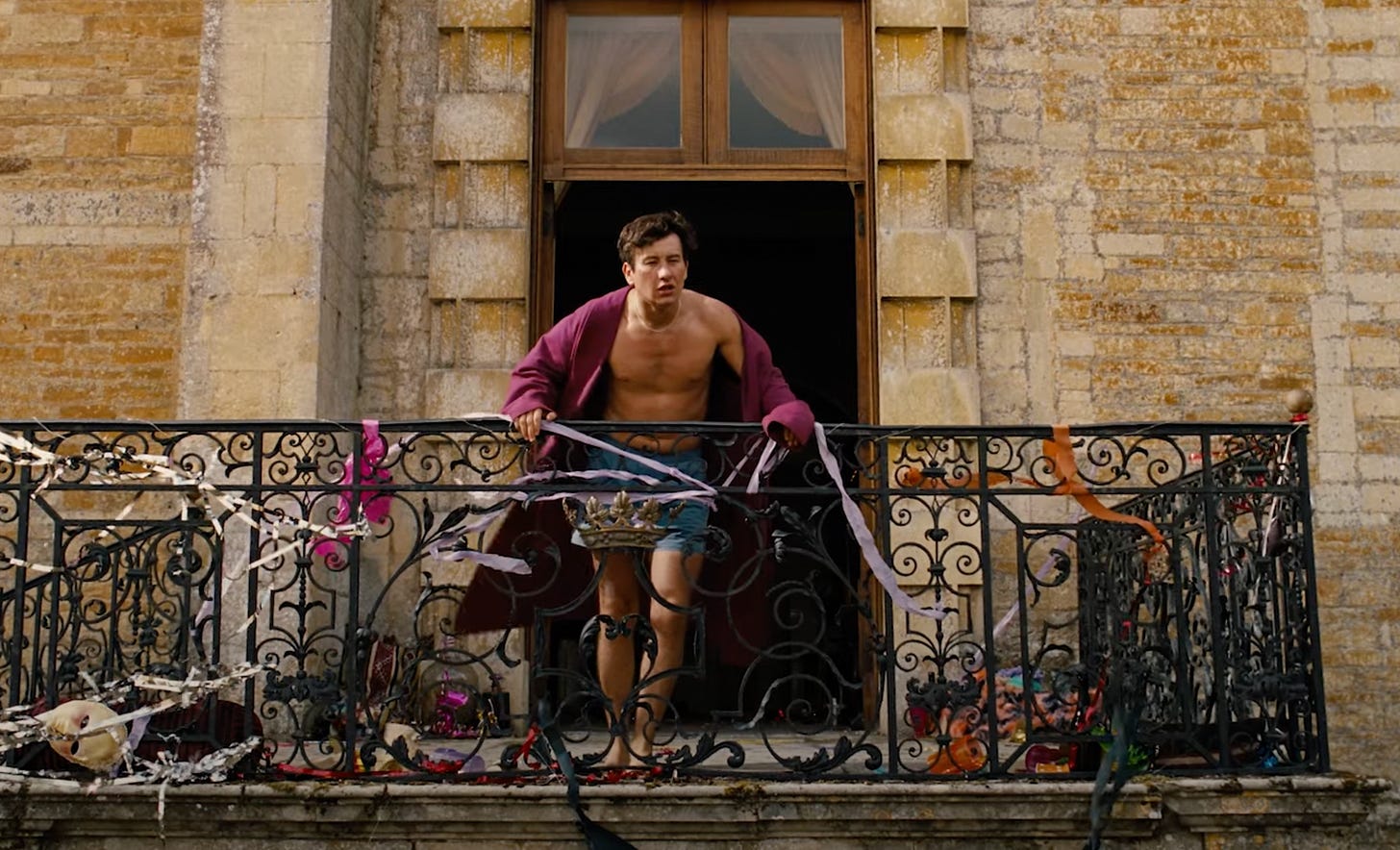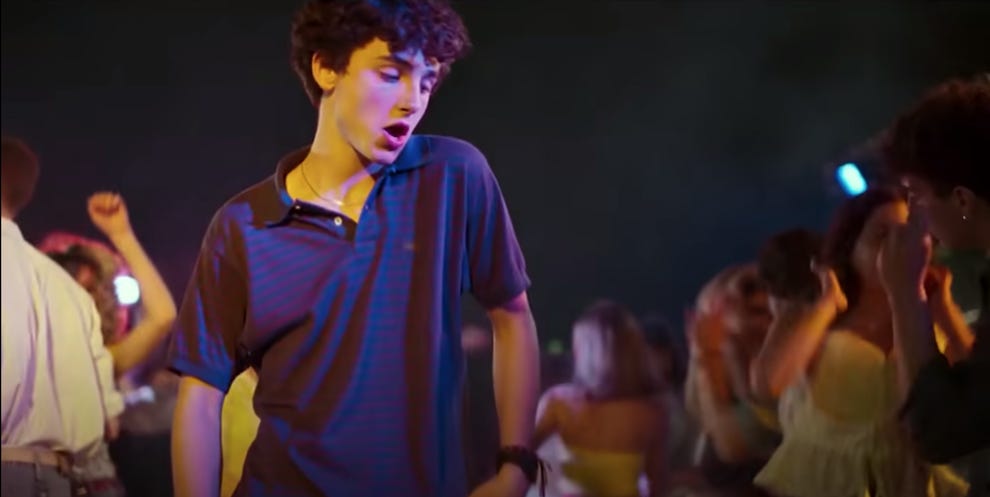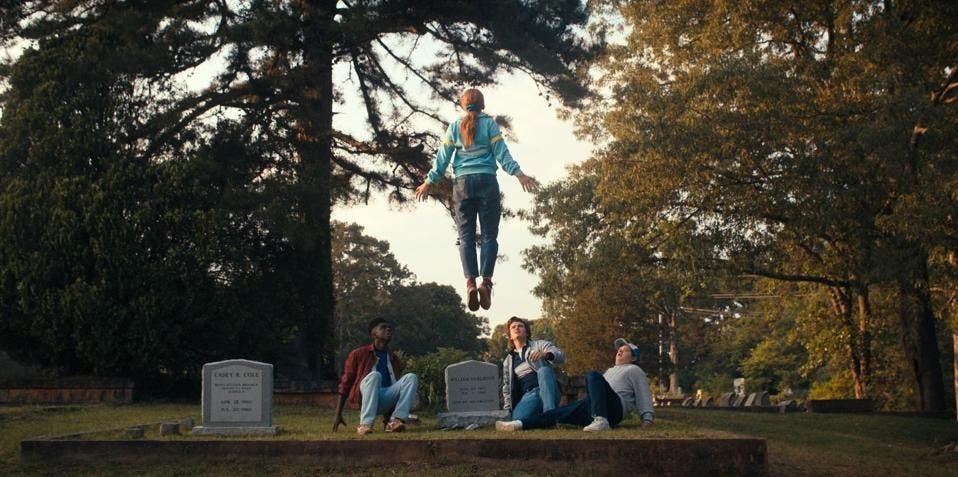Before it was officially brat summer, you couldn’t be in public space for more than ten minutes without hearing Sophie Ellis-Bextor’s “Murder On The Dancefloor.” The song, released in 2001, had peaked at number two on the UK charts and then faded into relative obscurity, popular but not that popular. Some of Ellis-Bextor’s songs have a respectable few million streams, but have failed to reach a broader audience.
“Murder On The Dancefloor” is having a renaissance, thanks to it’s placement in the hit movie Saltburn (2023). In fact, it was almost the song of the summer; it’s quite the idea to think that this coveted title almost went to a song released in 2001 that didn’t even globally chart—but it’s not the first time.
In 2017, Call Me By Your Name took the world by storm, less niche than Saltburn but without the benefit of TikTok virality. One of its central scenes is pointedly soundtracked by the Psychedelic Furs’ “Love My Way”, another temporally localized hit brought back from the dead. “Love My Way” was everywhere that summer; remixes played in the clubs to hordes of gay-awakened young people. Charting alongside impossibly modern songs like “Despacito”, “Love My Way” had its biggest streaming week ever that summer, thanks to prominent placement in a popular film.
Although it can sometimes feel like different art forms are rather siloed, reflecting different aspects of culture, there is a clear connection between music and movies. There are some pairings so strongly linked that they cannot exist without the other in the public consciousness: “Don’t You (Forget About Me)” and The Breakfast Club (1985), “9 to 5” and the movie of the same name (1980), “Accidentally In Love” and Shrek (2001), to name a few. As people seemingly watch fewer and fewer movies, it’s remarkable that this relationship has remained intact.
What is it about a well-paired song and scene that cement both as iconic? “Love My Way” was certainly played in the years intervening its release and its placement in Call Me By Your Name, but it didn’t have the staying (or returning?) power of other similar 80s new wave tracks. The movie gave it a new lease on life and an introduction to a younger audience who appreciated it for its novelty, not its age.
I’ll include the popular TV show Stranger Things in the category of movies for the sake of arguing that Kate Bush’s “Running Up That Hill (A Deal With God)” got a similar treatment last year when it surged in popularity after appearing in a TV season streamed for 1.4 billion hours. In the age of algorithm-driven music listening, hearing a song in a movie is a rather organic method of discovery. More people heard Kate Bush, despite her cult following, in that episode than probably had since her peak popularity in the 1980s. “Running Up That Hill” made the list of 2022 hits, reaching more than a billion streams.
Perhaps most interestingly, these seemingly incongruous, decidedly un-modern songs are assimilated completely by Internet culture, playing alongside music written and released decades later. As the whole concept of genre falls apart and there is no one definitive sound of our time, it’s not all that strange to hear something as singular as “Running Up That Hill” at a pool party or in a coffee shop. Moreover, the genre association is eclipsed by the movie association, which is necessarily new.
Over time, these songs take on a second life of their own. “Love My Way” still makes me think of that scene from Call Me By Your Name, but I’m sure there are people who heard it that summer, liked it, and never saw the movie or learned of the reason for its resurgence. I started hearing Kate Bush playing an awful lot in 2022 before I ever saw any clips from Stranger Things. Especially if—when—these songs make it to TikTok, they become so dissociated from their origins that they seem to take on an extra-temporal feature: not new or old, just trending.
I like to think that the vital cultural appreciation of art is well enough intact that music and movies still commune with one another across the medium of audience. Art remains meaningful and relevant via this connection, which helps it to reach wider and touch more deeply. There is so much to be gained from engaging with both new and old media—you might even discover the song of the summer.






I went to watch 'Perfect Days' last night after reading this article earlier on - potentially another one to add to the list of films irrevocably tied to their soundtracks.